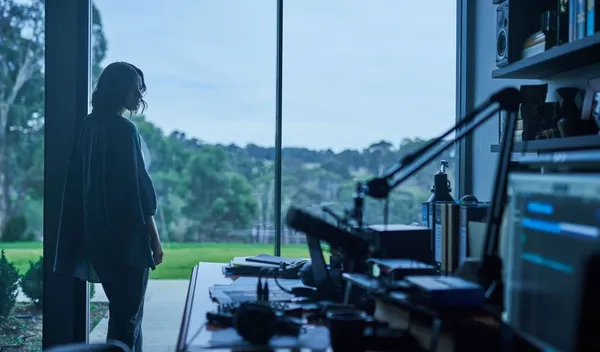Eye For Film >> Movies >> Monolith (2022) Film Review
Monolith
Reviewed by: Jennie Kermode

When trying to make a first film, it really helps to have a script which is centred on a single location and keep the number of actors to a minimum. In Matt Vesely’s feature début, which is screening at SXSW 2023, we spend most of the running time looking at just one woman (Lily Sullivan) in just one room. A podcast contributor, she engages with the world through a series of interviews. It’s a tightly focused project which takes viewers to an unsettling place and should get both director and star some serious attention.
Vesely's background is in continuity, which requires a person to have both an eye for detail and something of an obsessive streak. That’s the perfect starting point for a film about the danger of getting sucked into, and consumed by, a story. It’s a film full of tiny little observations, in images and dialogue, which add to the intrigue as we watch but threaten to put us in a similar position. The podcast is called Beyond Believable and it’s implied early on that the interviewer has screwed up in the past by chasing stories which strained credulity a bit too much, and failing to stand them up. When she received an anonymous email tip-off about strange black bricks, her concern was more that the story would be too slight, but it soon becomes apparent that there’s something genuinely weird going on here – and perhaps dangerous.

To answer the question which many readers will be wondering about, no, these black bricks do not see to be related to the monoliths of 2001: A Space Odyssey. Not only are they much smaller but they don’t accord with the same Pythagorean proportions. They are described by more than one interviewee as unusually, intensely black, and when we finally see one Vesely uses a clever trick to ensure that, although he can’t render that on screen, the illusion is not broken. As the interviewer gradually encounters more people who seem to have ‘received’ them (by way of a process which they find too traumatic or shameful to discuss), we are gradually able to build up a set of associations around them, but enough mystery is preserved throughout to maintain a sense of their otherness, as if they are part of a phenomenon genuinely too vast or sophisticated for us to grasp.
Often focusing on the audio equipment which the interviewer is using, to emphasise her intense focus on what she’s listening to, Vesely’s camera directs our attention very effectively and makes use of every aspect of the small set. When not at her computer or using her mobile, the interviewer has a pet turtle to talk to, and even this will eventually have its own story to tell. As the discoveries become more disturbing, the initially neat room gradually descends into a chaotic state, and the tale of the black bricks gets too close for comfort in an unexpected way.
Though there’s a lot going on here thematically around conspiracy theories and the process through which news – real or fake – is manufactured, the film also concerns itself with issues around self-examination, who needs to do it and who needs to stop. Early on, the interviewer’s professionalism is challenged; she insists that she’s a proper journalist, but she evidently has no training around keeping a safe distance or protecting her listeners. She doesn’t tell one man she’s recording until after she’s started. She blackmails a woman into speaking to her by claiming that other journalists will twist her words otherwise. These are commonplace failings, but they point to a deep-rooted darkness in the interviewer’s character which is pertinent to both the plot and the film’s social commentary.
Throughout, Sullivan uses a gradual tightening of her muscles to show us the tension building up in her character, despite moving around only within the confines of the room. When, in its final scenes, the film opens up and there’s a flurry of action, it’s a shock. Monolith is a great example of how small things can be used to tell a big story, and it will stay with you.
Reviewed on: 15 Mar 2023
















